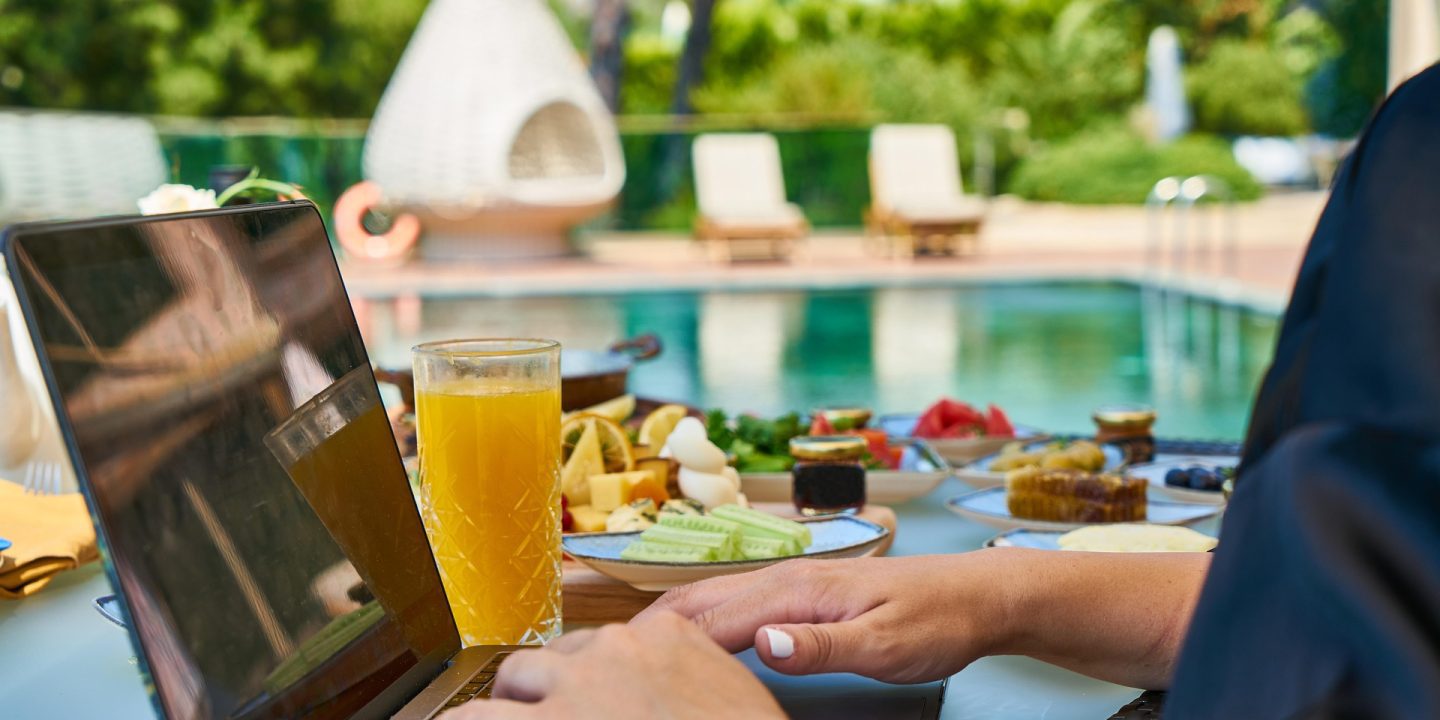
Staying at a hotel comes with plenty of perks—room service, a well-stocked minibar (if you’re lucky!), and, of course, complimentary Wi-Fi. But while free internet access sounds great, it often comes with hidden risks, ranging from sluggish speeds to serious security threats.
That’s why packing a reliable VPN should be just as essential as your travel-sized toiletries. A VPN doesn’t just protect your data—it also lets you bypass geo-restrictions, securely access your favorite streaming platforms, and even unlock exclusive travel deals. Let’s explore why using a VPN in a hotel is a game-changer.
How Does a VPN Work?
VPN stands for Virtual Private Network, a tool that encrypts your internet traffic and shields your identity online. Once you connect, it creates a secure tunnel between your device and the internet, making it nearly impossible for outsiders to snoop on your data.
A VPN also masks your real IP address, preventing websites, services, and even your internet provider from tracking your actual location. Whether you’re on a private home network or using public Wi-Fi at a hotel or airport, a VPN ensures your data stays safe.
The Risks of Using Hotel Wi-Fi (and How a VPN Protects You)
1. Safeguard Your Privacy
Free Wi-Fi is one of the biggest selling points for hotels, helping guests avoid pricey international data charges. But here’s the problem—free doesn’t always mean safe.
Public Wi-Fi networks, including those in hotels, are prime targets for cybercriminals. Hackers lurking nearby can intercept your data, gaining access to personal details like passwords, credit card information, and private messages. Some even set up fake Wi-Fi hotspots that look legit but are actually traps to steal your data.
With a VPN, your internet traffic is fully encrypted, meaning even if a hacker tries to intercept it, they’ll only see scrambled, unreadable data. No more worrying about identity theft or prying eyes.
2. Avoid Malware and Cyber Attacks
Think hotel Wi-Fi is just risky for data theft? Think again. Cybercriminals often use public networks to distribute malware—malicious software that can infect your device, steal sensitive information, or even lock you out completely.
Once malware sneaks in, it can spread to other devices, slow down your system, and compromise your files, passwords, and financial details. While a VPN doesn’t directly remove malware, it minimizes the chances of your data being intercepted in the first place. To stay extra safe, combine it with a solid antivirus program.
3. Access Your Favorite Streaming Services
If you love watching movies and shows while traveling, a VPN is a must-have. Many streaming platforms, like Netflix, Amazon Prime Video, and Hulu, have different content libraries depending on your location.
Ever tried watching a U.S. show from Europe, only to find it’s unavailable? That’s because of regional licensing restrictions. A VPN lets you bypass these blocks by connecting to a server in your home country, making it look like you’re browsing from there.
So, whether you’re in London and want to access your U.S. Netflix library or traveling in Asia and missing your favorite BBC programs, a VPN lets you stream seamlessly.
4. Score Better Travel Deals
Here’s something most travelers don’t realize—websites often adjust prices for flights, hotels, and car rentals based on your location. If you’ve ever noticed a flight getting more expensive after checking it multiple times, that’s no coincidence.
By using a VPN, you can change your virtual location and check prices from different regions. Sometimes, switching to a country with lower demand can reveal cheaper airfare and hotel rates, saving you a nice chunk of cash on your trip.
Extra Tips for Staying Secure on Hotel Wi-Fi
Even with a VPN, taking a few extra precautions can keep you even safer:
- Avoid sensitive transactions – Try not to enter credit card details or access online banking on public networks. If you must, always use a VPN.
- Enable Two-Factor Authentication (2FA) – This adds an extra security step beyond your password, making unauthorized access much harder.
- Use strong, unique passwords – Reusing the same password for multiple accounts is risky. If one gets compromised, they all could be.
- Keep your software updated – Regular updates fix security vulnerabilities that hackers can exploit.
- Disable auto-connect – Your device may automatically join insecure networks without your knowledge. Manually connecting ensures you only use trusted ones.
Final Thoughts
Hotel Wi-Fi might be convenient, but it’s far from secure. Whether you want to protect your personal data, enjoy unrestricted streaming, or find the best travel deals, a VPN is an essential travel companion. Before your next trip, make sure your VPN is ready to go—it could save you from major security headaches and even put some extra cash back in your pocket!









